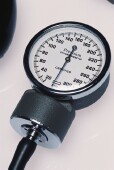- 8 Ways to Increase Dopamine Naturally
- 7 Best Breads for Maintaining Stable Blood Sugar
- Gelatin vs. Collagen: Which is Best for Skin, Nails, and Joints?
- The Long-Term Effects of Daily Turmeric Supplements on Liver Health
- Could Your Grocery Store Meat Be Causing Recurring UTIs?
- Are You Making This Expensive Thermostat Error This Winter?
- Recognizing the Signs of Hypothyroidism
- 10 Strategies to Overcome Insomnia
- Could Artificial Sweeteners Be Aging the Brain Faster?
- Techniques for Soothing Your Nervous System
U.S. Panel Rejects Blood Pressure Screening for Kids, Teens


MONDAY, Oct. 7Not enough evidence exists to recommend that children and teens be screened for high blood pressure, a U.S. government-appointed panel says.
High blood pressure among American children and teens has been rising, in part due to the increase in childhood obesity. Several expert groups have recommended that children and teens be screened for high blood pressure.
It’s difficult to predict which youngsters will develop high blood pressure as adults and it’s unclear whether lowering blood pressure in children and teens leads to improved cardiovascular health in adulthood, the U.S. Preventive Services Task Force said in a final recommendation released Oct. 7.
The panel also noted that very little research has been done on the effectiveness and safety of blood pressure medications when used for months or years by children and teens.
The recommendation applies specifically to youngsters who have no signs or symptoms of high blood pressure or an underlying health problem. It also applies only to primary hypertension and not secondary hypertension, which is usually caused by an underlying health problem and treated as part of that underlying condition.
The task force recommendation, which is based on a review of studies published since 2003, was published online Oct. 7 in the journals Pediatrics and the Annals of Internal Medicine.
“The Task Force recognizes the importance of cardiovascular health for all people, including children and adolescents,” panel member Dr. Kirsten Bibbins-Domingo said in task force news release.
“We don’t know if lowering blood pressure in youth leads to improved cardiovascular health in adulthood. We also don’t know the long-term benefits and harms for children and adolescents who initiate blood pressure medications when they are young,” she noted.
“While there is much we don’t know, we do know that eating a healthy diet, being active, and maintaining a normal weight are ways children and teens can improve their cardiovascular health,” she added.
The task force called for more research to determine if screening and treatment of high blood pressure in youngsters improves their long-term cardiovascular health.
More information
The U.S. National Kidney Disease Education Program has more about high blood pressure and children.
Source: HealthDay
Copyright © 2026 HealthDay. All rights reserved.










